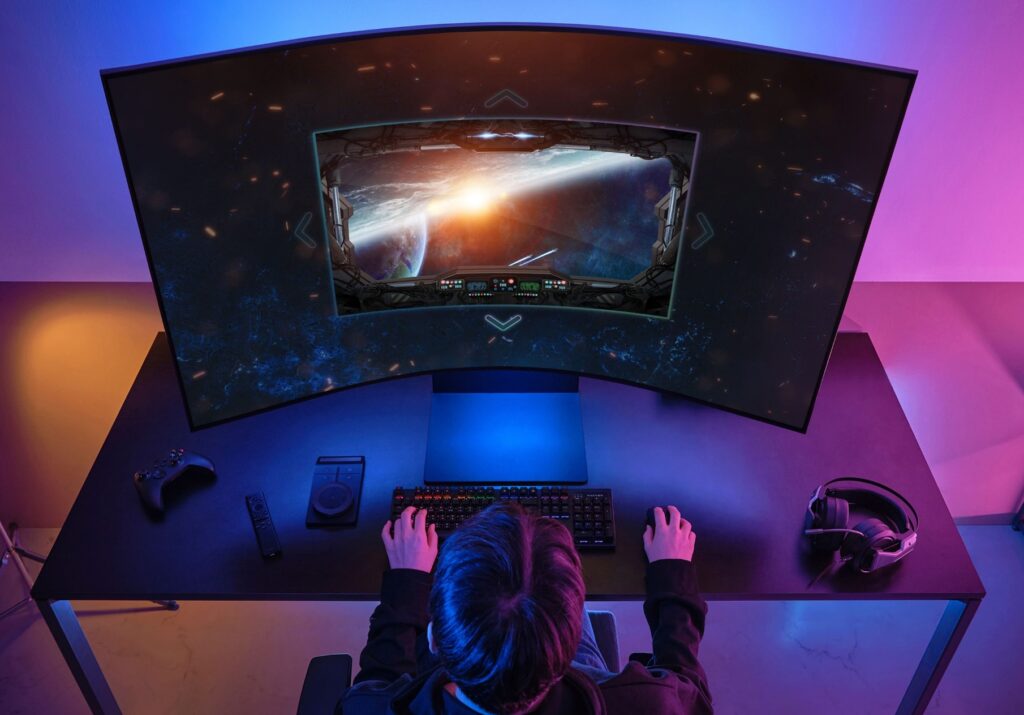Image by: Samsung USA
Gaming and its effects on students and school performance is a perennial debate in the digital age. The science to prove it or say otherwise isn’t exactly refined, but consensus says parents feel that video games are indeed detrimental to the youth. Some organizations, doctors, and scientists have disputed that it has some benefits, so we can understand why many are still confused.
Gaming and its Popularity in the 21st Century
In this context, gaming is playing games on electronic devices such as computers, consoles, and now mobile phones. We’re at an age where smart appliances like modern refrigerators have screens you can play on. Entire generations of kids and adults are into it, and there are various debates regarding its positive and negative effects.
Gaming existed for decades before the 2000s, but it peaked after that when the machines and the internet became affordable and accessible. This development paved the digital highway for multiplayer gaming at home. Eventually, E-Sports or competitive gaming became popular following that, growing into a multi-million-dollar industry in the last decade.
Of course, the prospect of playing games for a living spread wildfire further, with several influencers and brands behind it. Some schools have even started E-Sports programs aside from the typical sporting categories. Believe it or not, “professional gamer” is now widely accepted as a career.
Pros of Gaming for Students and School Performance
Gaming Enhances Problem-Solving Skills and Creativity – Games have the ability to enhance logic and problem-solving skills in children. Studies suggest that some aspects, like in-game puzzles, open-world or sandbox environments, and conflicts in rich storylines, can enhance a child’s ability to navigate, plan, and apply solutions to problems. Creating characters and “modding” can open a child’s path to self-expression, fulfillment, and higher self-esteem.
Gaming is a Digital Window for Social Skills – Kids, especially the introverted, can find the encouragement to make friends and engage in social activity through multiplayer games. Titles like World of Warcraft or Valorant require extreme teamwork, so everyone must learn to work with their group and be amicable to achieve success. Learning teamwork and dedication toward an objective is essential for success in the real world as it is in the virtual alternative.
Gaming Enhances Leadership Skills – With the social skills kids earn from gaming come leadership skills. Playing in groups can teach this since groups or guilds can build social constructs where some are required to manage and take point. Most of the time, new joiners start out as followers, but there is always room to rise in the ranks, just like in the real world.
Gaming can Motivate – Games always have goals or objectives, and the whole gist is to reach that or win. Winning often wakes up a child’s motivation and energy to try his best and obtain something, whether it’s an award in school or a nice set of armor in a game. Most games basically teach players to climb a ladder or work to achieve something, just like at work or in school.
Gaming can Improve Memory – Video games can stimulate your child’s brain, just like how muscle grows when you lift heavy things. Studies have shown that games have improved cognitive functions in the brain. This benefit goes both ways since adults who play have shown better performance at memory tasks.
Cons of Gaming for Students and School Performance
Gaming is Addictive – Gaming, if left unchecked, can swallow a child’s life if all they do is sit and play. Addiction can make them leave tasks undone and sometimes damage social skills since gaming addicts often stay indoors. It can also be detrimental to their health since gaming can be sedentary.
Gaming Can Promote Anti-Social Behavior – Getting addicted to games can isolate a child from his friends and classmates. This leaves less time for other activities, including studies or homework. It can also isolate a gamer from their family, but playing online still has a semblance of a social life if they play with other kids or groups.
Gaming Can Promote Violent Behavior – This issue is probably the most debated of all due to the increase in violent crimes today. Studies have shown that games with simulated violence can desensitize a child to it, making them more prone to hurt others or themselves. Games are often marked or rated for specific age groups, but there is no actual restriction to ensure that younger users cannot access mature content.
Games can Lower Performance in Schools – If we leave our kids unchecked, the tendencies above can become their harsh reality. Destructive behaviors like isolation and poor time management can harm growth and grades. The prospect of gaming professionally can also affect a child’s trajectory since they might think that school will be unnecessary.
What Can We Do as Parents?
Becoming proactive or involved in a child’s day-to-day life and not just their gaming aspect can help avoid the adverse effects above. Knowing what games your child is consuming helps screen out what’s inappropriate for them. You can also help them manage their time so their schoolwork doesn’t get left out.
Parents need to be firm regarding all this, but we should also be open to gaming to avoid creating a rift in the family. Boundaries need to be established, but kids also need some room or freedom to enjoy their passions or hobbies. Moderation is a critical ingredient in satisfying the kids and your standards for their future.
Or, if you are open to it, why not join them and enjoy the games they play? Studies show that kids feel most loved when their parents spend time and play with them. The benefits of gaming with your child can improve your relationship, make them trust you, and eventually, open their vibrant world to you.

Leave a Reply